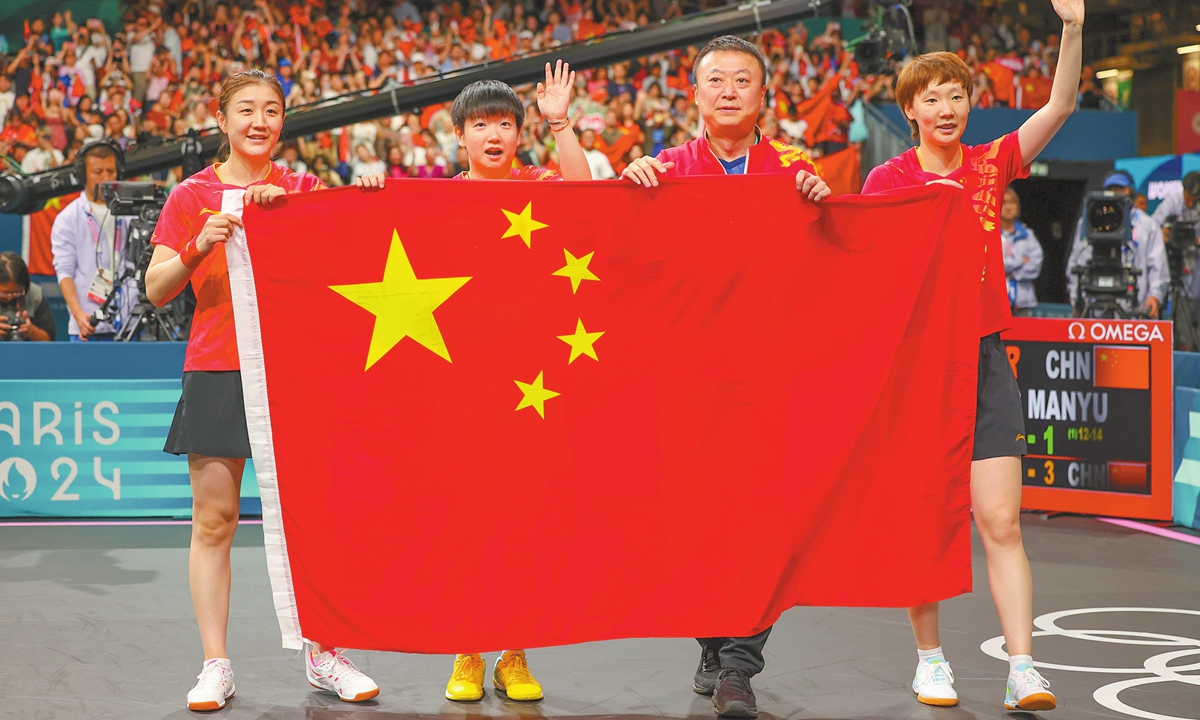SPORT / FEATURE
China’s Olympic gold medal map:Which provinces lead the pack?

China's women's table tennis team retains their Olympic title at Paris 2024 Olympic Games after overwhelming Japan 3-0 in the final on Saturday. This victory not only secured China's 37th gold medal of these Games, but also marked a historic milestone - the Chinese delegation's 300th gold in Summer Olympic history. Photo: VCG
As the Paris Olympics came to an end, the Chinese sports delegation has set a new record for its best-ever performance in an overseas Olympics, securing 40 gold, 27 silver, and 24 bronze medals. Since China's return to the Olympic Games in 1984, the nation has garnered a total of 303 gold medals, with 322 athletes achieving Olympic champion status. Here is China's Olympic gold medal map.
Recent data reveal that these Olympic champions hail from 26 provinces, autonomous regions and municipalities across China. Leading the way is Northeast China's Liaoning Province with 38 Olympic champions, followed by East China's Jiangsu, Central China's Hubei, East China's Shandong and Zhejiang, and South China's Guangdong each boasting over 20 champions, according to a report by the National Business Daily.
Liaoning: hometown of Olympic champions
Since shooter Li Yuwei claimed Liaoning's first Olympic gold in 1984, the province has produced 38 Olympic champions, more than any other region in China. In the Paris Games, Ma Long, a table tennis player from Anshan, Liaoning, secured his sixth Olympic gold, making history as China's first six-time Olympic champion. Ma's achievement adds to Liaoning's reputation for producing table tennis champions, including former stars like Wang Nan, Ma Lin, Guo Yue, Li Xiaoxia and Liu Shiwen.
Anshan, in particular, has been recognized as a "City of Olympic Champions" by the Chinese Olympic Committee, having contributed 16 Olympic gold medals.
Beyond table tennis, Liaoning has also produced nine volleyball champions, four top athletes in judo, three gold medalists in badminton and another three top performers in weightlifting.
Jiangsu, Zhejiang and Shanghai: dominating the pool
The Paris Olympics saw Pan Zhanle from Wenzhou, Zhejiang, set a new world record in the men's 100-meter freestyle, adding another gold to China's tally. He also contributed to the team's victory in the men's 4x100-meter medley relay, reinforcing the dominance of the Jiangsu-Zhejiang-Shanghai region.
Since swimmer Qian Hong from Hebei won China's first Olympic gold in the women's 100-meter butterfly in 1992, the country has produced 18 Olympic swimming champions. Eleven of these athletes are from Jiangsu, Zhejiang and Shanghai - with Zhejiang contributing six, Shanghai three, and Jiangsu two - accounting for about one-fifth of the region's total Olympic champions.
Diving: a legacy of champions from Guangdong and Hubei
China has secured gold in diving at every Olympic Games since Seoul 1988. Guangdong and Hubei have played important roles, contributing over half of China's diving champions.
Guangdong, with 10 champions, is considered the pioneer of Chinese diving. The province has produced stars like Quan Hongchan, the youngest three-time Olympic gold medalist, who hails from the city of Zhanjiang.
Since the 1950s and 1960s, nearly all national diving champions in China have been from Guangdong. The first national diving training team was also primarily composed of Guangdong athletes. Currently, Guangdong has 13 diving talent training bases located in cities including Guangzhou, Zhanjiang, Dongguan, Zhongshan and Shantou.
Hubei, home to eight diving champions, made its mark with Zhou Jihong's gold in the women's 10-meter platform at the 1984 Los Angeles Olympics, the first for China in diving. Hubei has since developed a robust training system that has produced champions like Chang Yani and Wang Zongyuan.
Global Times

